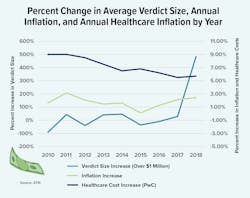How safety directors create litigation firewalls for fleets
Safety directors can—and often are—the key to any fleet’s success at building sophisticated safety strategies and "cultures."
But that does not happen unless there’s buy-in from ownership and the top of the C-suite, often-expensive investments in at least some of the latest truck and trailer technologies and, perhaps most importantly, comprehensive, sophisticated, and ongoing driver training and coaching.
"The worst time to realize your fleet’s safety program doesn’t measure up is when you’re answering attorneys’ questions in court or at a deposition," Mark Murrell, co-founder of CarriersEdge, the online driver training provider, and co-creator of Best Fleets to Drive For, wrote in a previous column for FleetOwner.
"Yet, even the best companies can find themselves in that uncomfortable position. If they do, it’s a sure bet the fleet’s own safety training program is one of the first places plaintiffs’ attorneys will look for material to help their cause."
See also: How one fleet is staying on the cutting edge of safety
So, what's the silver bullet for safety before matters ever get to crashes, litigation, and possible "nuclear" verdicts?
There are many, as it turns out, starting with "a demonstrated commitment to safety," Murrell said during a recent interview with FleetOwner.
Dana Achartz, fleet safety director at Belleville, Illinois-based Commercial Transport, a food-grade and hazmat hauler of about 150 tractors and around 160 trailers, agreed during her own interview. "Having driver hiring guidelines and following safety procedures is important for the safety of our work family, friends, our own families, and the motoring public," she said.
"You can’t put a price on the value of life," Achartz added. "When you deviate from these standards, you raise the bar on the level of risk a company faces when they put unqualified drivers on the road. It’s not worth it. How would one sleep at night knowing the risk and dangers they’re putting on the public roads just to boost their revenue? Those companies [that] are out there running their businesses recklessly are the reasons nuclear verdicts are successful.
"Another thing to consider: If there’s a fatality, everybody just thinks trucking has deep pockets. People don’t realize … our profit margins are so slim. Fuel to driver wages to equipment maintenance. We have to work four or five times harder just to break even. A catastrophic event falls on the entire company."
See also: How KTG fleet stays focused on safety
Much of fleets’ safety efforts should be centered on drivers, Murrell, Achartz, and another safety chief, Michael Lasko of Boston-area fleet Boyle Transportation, all emphasized. Even in areas that aren't all about education and training, they also agreed those topics are extremely important.
"It starts behind the wheel," Murrell said. "The consistent theme I hear in all the discussions about [nuclear verdicts] is that the fleets that are focused on their drivers and the motoring public do better. This is how that gets illustrated: There are fleets that assign drivers training every month no matter whether they need it or not, which shows that you’re going through a rote activity. The people who assign less training but with more purpose are the ones that perhaps have a better story. They’re training their drivers appropriately and following up."
He added: "It’s also very important for fleets to recognize that training isn’t always the answer. If an issue wasn’t caused by a lack of knowledge—a driver might have been tired or overworked, for example—the right answer might be to change some processes in operations. The companies that we’ve seen do better in [safety] are ones that focus on process. Build a more holistic solution. That’s one of those things that is simple yet difficult—simple to do, difficult to execute. That's how you create a well-rounded culture."
Steve Keppler, co-director of Scopelitis Transportation Consulting, sees two views: the safety and accident-prevention angle and the view of the litigation landscape against trucking. His consultancy advises the trucking and transportation industries on myriad issues and is an arm of Scopelitis, Garvin, Light, Hanson & Feary, a law firm that often represents commercial carriers in many kinds of legal cases.
“From where I see it at a 10,000-foot level, it comes down to carrier safety culture and their safety management practice—everything from how they’re recruiting and hiring their drivers. They have a plan to manage their safety challenges. It’s not just the policies, but are they following them," Keppler said.
"Lack of management plan and strategy is a problem and a vulnerability in litigation," he added. "It’s a totality of how you're collecting [data with onboard technology] and how you’re managing it. Do you have a comprehensive data-management policy? These plaintiffs’ lawyers are attacking systemic problems in your operations—you’re not evaluating your crashes, not managing your CSA data. These court cases aren’t about the drivers out on the road. They’re focused on the carrier, its drivers, its practices.”
Keppler advised fleets not to fall in love with every technology but to carefully evaluate every piece of tech's pros and cons. "Dashcam data has emerged because, with fleets, it helps with exoneration in crashes. Technology can also implicate a driver, he said, warning that systems like lane-departure warning and dashcams are not required by FMCSA. "Those should not be held against you. We know these technologies work; make sure you are using these the way you intend to."
Fleet culture centered on drivers
Boyle Transportation's Lasko directs safety for a fleet of about 100 tractors and mostly refrigerated trailers, though Boyle accepts some dry-van and flatbed business. The small fleet's geographic reach is wide; it runs mostly east of the Mississippi but also covers all lower 48 states and Canada, Lasko said.
Boyle's safety standards are especially lofty, Lasko emphasized, because it hauls "high-value, high-security" cargo for the Defense Department and DoD's contractors, life sciences, pharmaceutical, and bio-tech companies, and occasionally even transports radioactive materials. "Boyle has a small but highly committed leadership team," he added. "There's a great sense of pride here at Boyle to be supporting soldiers, sailors, airmen, and Marines and in the transporting of lifesaving medicines."
See also: CEOs stress building and keeping a solid safety culture
Boyle is highly decorated for safety and was the 2017 Truckload Carriers Association (TCA) Fleet Safety grand prize winner in the small-fleet division. Boyle also won a TCA top prize that year in the category for carriers that annually run 5 million to 15 million miles. Boyle was inducted into the 2022 Best Fleets to Drive For Hall of Fame.
Boyle “uses a methodical hiring and training approach that focuses on the learning needs of the individual driver,” he added. “Because of the nature of the goods we transport, we have to be a bit more restrictive than perhaps another participant in this industry.”
The Boston-area carrier’s pre-screen looks at a driver’s safety record, any accident history, and status with the federal Drug & Alcohol Clearinghouse. “Maybe a driver worked for a bad carrier. There are other violations that are indicative of poor performance of a driver, stuff that shows up on a pre-trip inspection. That’s kind of the lens that I look at it through. Is this person doing their required maintenance activities,” their pre-trips properly, he said.
Once under agreement to be hired, all drivers (regardless of prior experience) go through a five-day, 10-hour-per-day boot camp—Boyle was founded by Tom Boyle, a former military policeman and Massachusetts state trooper—that serves as orientation, Lasko said.
See also: Distracted car drivers are a growing risk to safe truck drivers
“We train them specifically on every piece of equipment they will encounter at Boyle, the technology we use, even … safe entry and exit from our vehicles,” Lasko said, using Boyle’s professional drivers’ reference manual—which is “written like an Army field manual”—that they can access 24/7 through the company’s proprietary smartphone app. Boyle, which centers training on CarriersEdge, also educates drivers on hours of service, its company policies, Federal Motor Carrier Safety Administration regulations, fatigue management (using the North American Fatigue Management Program), and defensive driving (using the Smith System).
“We empower our drivers to remove themselves from safety-sensitive situations when they need to, even if it’s just a situation where the driver needs to pull off the road to get some rest,” he said, adding that before and after orientation, drivers are paired with mentors.
Lasko, who spoke at a late-October FMCSA safety summit in Providence, Rhode Island, added: “All drivers receive the same training. Standard processes create standard results.”
One driver's perspective on nuclear verdicts
"Driving safely solves a whole lot of problems," Clark Reed said in a plain-spoken manner during an off-duty call with FleetOwner.
If his name sounds familiar, that's because Reed is regarded as perhaps one of the best out there today on the road. He's a trainer and driver for Hudson, Illinois-based Nussbaum Transportation, another 2022 Best Fleets to Drive For Hall of Fame carrier and a past TCA Fleet Safety award-winner that runs Certified RED, a detailed and continuing education and development program for its drivers. Reed, who has driven since 2005 and has seen the lower 48 states as a dry-van and flatbed hauler and as a tanker, estimates he's gone more than 2 million miles without an accident.
See also: ATRI report reinforces strong link between driver behavior, truck crashes
Drivers, he said, are among the Nussbaum employees who get quarterly updates from the company's president and CFO, Bill Wettstein. These updates, Reed said, sometimes delve into the topic of nuclear verdicts and what they're doing to trucking and Nussbaum's bottom line. "Most drivers don't even think about" the topic, which Reed said seems far from a driver's daily routine.
But he summed up the stakes for all men and women behind the wheels of trucks on the road: "One quick mistake, one lapse in judgment, and you involve yourself in a situation that leads to a nuclear verdict. I’m a big proponent of running legal all the time, paying attention to your ELD, etc., because a lawyer’s going to find it if you haven't. It could lead to a nuclear verdict. You could lose your job. Your company could close up. So, it's worth thinking about."
Technology's part ... and that perception thing
The brain trust at Boyle Transportation believes in the latest technology, safety director Lasko added, and the fleet has invested in just about everything available, including automatic emergency braking, advanced driver assistance systems, collision mitigation braking systems, lane-keeping assist, adaptive cruise control, and blind-spot warning. The carrier has been an early adopter of many of these systems; it often goes where other fleets fear to tread, he said. For example, Boyle has roll stability control on both its tractors and trailers and turned to that technology before many fleets saw it as necessary.
See also: ADAS in trucking: How insurance companies, attorneys are using fleet data
Achartz said Commercial Transport uses Netradyne forward-facing cameras on its tractors that give numerous alerts, including real-time notifications, but for now eschews in-cab systems that observe professional drivers. "Insurance companies love the ones that are looking at the drivers themselves," she said. Of onboard cameras overall, she said, "They're black and white; you're right or wrong. If you're wrong, you add another zero to the check."
One involved a passenger-vehicle driver found to be intoxicated who rear-ended a parked construction vehicle adjacent to a Boyle tractor-trailer. The other involved a driver enraged at being behind a slower-moving Boyle truck who drove on the median strip, sped up, passed, and slammed on the brakes in front of Boyle’s driver. A combination of the truck driver's alertness and his onboard technology likely helped avoid property damage and possibly injuries in that incident.
See also: Spike in claims costs overshadows U.S. Xpress early restructuring progress
“Drivers encounter a lot of adversity on the road around them,” Lasko remarked. “They have to know how to protect themselves after an accident; drivers and carriers need to bring their 'A' game to keep themselves out of fraudulent litigation and lawsuit abuse. The information that can only be obtained in the minutes immediately after a collision is vital in the defense of these false claims.”
Lasko had some other observations: “It’s horrible timing that this issue of lawsuit abuse is going into full swing, in the midst of supply challenges and driver shortages. We allow lawsuits to be used as a weapon, and that has a direct impact on everyone's wallet, whether they work in this industry or not.”
And about the "old" perception of drivers, as “the last cowboys,” and of present-day trucking: “We are such a highly regulated industry, new regulations come out every month. That [view of truckers and trucking] has long since come and gone. This industry is leading the way in terms of safety and protecting the lives of motorists.”
This is the last part of a three-part series. Part 1 and Part 2 also are live on FleetOwner.com.
About the Author
Scott Achelpohl
Managing Editor
Scott Achelpohl is a former FleetOwner managing editor who wrote for the publication from 2021 to 2023. Since 2023, he has served as managing editor of Endeavor Business Media's Smart Industry, a FleetOwner affiliate.




